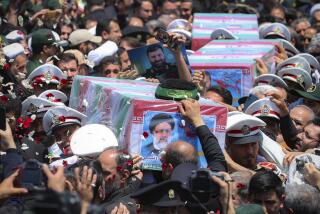Mob Kills Shiite Leader at Shrine
- Share via
TEHRAN — A mob apparently bent on revenge stormed Iraq’s holiest Shiite Muslim shrine Thursday, killing a noted religious leader who had returned from exile only last week under American escort.
The 40-year-old religious leader, Abdel Majid Khoei, and two aides were shot and stabbed to death at the gold-domed Imam Ali Mosque in Najaf.
According to Khoei’s nephew in Iran, the mob initially intended to kill just Haidar Rafaii, who had been appointed custodian of the mosque by Saddam Hussein.
The members of the mob had been waiting four years to exact their revenge on Rafaii for the killing of Mohammad Sadeq Sadr, a prominent religious leader killed in 1999 by Hussein’s regime.
They swarmed the mosque chanting “Sadr, Sadr,” and tried to drag Rafaii into the shrine to hang him.
Apparently trying to defend Rafaii, Khoei urged the crowd back.
“This is sacrilege,” he reportedly told the crowd moments before he was shot, along with his two aides and Rafaii. “We are all Shia and you must respect the imam’s shrine.”
The mob dragged the wounded Khoei through neighboring streets, before stabbing him to death with knives, according to nephew Jawad Khoei in the Iranian city of Qom, citing witness reports.
Thursday’s violence took place at a meeting called to discuss who would care for the shrine in the post-Hussein era, and how to mediate the removal of Hussein loyalists who had been holed up in the mosque since U.S. troops took over the town in heavy fighting last week.
Iraqi opposition sources in Tehran said Khoei’s killing could unleash bloody score-settling between Iraq’s Shiites and remnants of Hussein’s regime, which suppressed the country’s Shiites. Khoei had lived in London since 1991, when he fled Iraq after Hussein’s brutal suppression of a Shiite uprising after the Persian Gulf War. His father, Grand Ayatollah Khoei, was the undisputed spiritual leader of Iraqi Shiites for more than three decades, until his death in 1992.
Khoei had created controversy in Shiite circles recently because of his frank pro-American stance on the war. A high-ranking Shiite religious leader reportedly urged his followers not to hinder the U.S. advance. In interviews, Khoei said he believed that meant the leader backed the U.S. war, to the consternation of Shiites throughout the Middle East. He returned to Najaf last week under American military escort.
“We presume Al Khoei is trying to help the Shia, but no one could stomach his arriving in Najaf on American tanks,” said Sheik Ibrahim Hammoudi, a senior member of the Supreme Council for Islamic Revolution in Iraq, the leading Shiite opposition group based in Iran.
Khoei’s death deals a blow to pro-American Iraqis who seek positions of influence in a transitional government and beyond.
In Washington, the State Department warned that Khoei’s slaying served as an important reminder of the need to create a stable alternative to Hussein’s regime.
“It’s a reminder that Iraq is still dangerous in many places and a reminder of how important it is for all of us to create a situation where Iraqis can express themselves freely, where all points of view can be expressed freely and without intimidation or violence,” spokesman Richard Boucher said.
British Prime Minister Tony Blair said he was “appalled” by the death of Khoei, whom he had met several times in London.
“He was a religious leader who embodied hope and reconciliation and he was committed to building a better future for the people of Iraq,” he said in a statement.
The mosque where the men were killed contains the tomb of Imam Ali, the son-in-law of the prophet Muhammad and the most revered Shiite leader.
*
Times staff writer Robin Wright in Washington contributed to this report.
More to Read
Sign up for Essential California
The most important California stories and recommendations in your inbox every morning.
You may occasionally receive promotional content from the Los Angeles Times.













